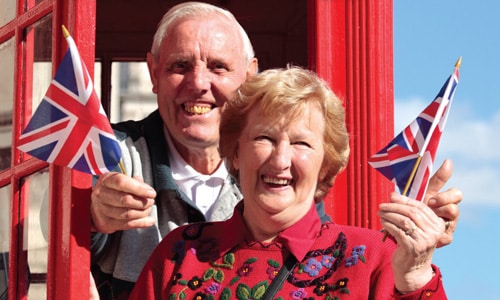Are you planning on retiring abroad as a British expat? Thousands of Britons dream of retiring abroad. Many people who have paid taxes into the UK tax system are now expats, including hundreds of thousands of British seniors.
You must, however, be aware of how moving abroad can impact your pension. There are numerous expat pension choices, but not all of them will suit you.
This guide discusses how to receive your pension if you reside abroad. Learn how UK employment, private, and state pensions operate for British expat retirees abroad.
If you are looking to invest as an expat or high-net-worth individual, which is what I specialize in, you can email me (advice@adamfayed.com) or use WhatsApp (+44-7393-450-837).
The information in this article is for general guidance only. It does not constitute financial, legal, or tax advice, and is not a recommendation or solicitation to invest. Some facts may have changed since the time of writing.
Implications to UK Pension when Retiring Abroad as a British Expat
Historically, the international rankings of the UK pension system have been very high. Since April 2016, there have been new pension regulations in the UK that include automatic enrolment for employer pension plans.
Additionally, both the legal retirement age for men and women in the UK has gradually risen. If you’re planning a retirement in the UK, the new state pension will give you with enough money and a good standard of living. But what if you want to retire abroad?
The UK Pension System
How does the UK pension system work when retiring abroad as a British expat? National Insurance (NI) contributions serve as the foundation for the UK State Pension.
NI is a kind of tax that can be withheld from wages at the source. Additionally, those who work for themselves might contribute voluntarily. You need a National Insurance number in order to pay NI.
The system depends on the working population being larger and making greater contributions than the state pension is deducted. Foreign nationals who work in the UK must apply for one.
Who is eligible for UK State Pension?

Normally, you must have paid NI contributions for at least 10 years (not necessarily consecutive) in order to be eligible for the UK State Pension. The amount of your pension then relies on how many years you have made contributions.
You must have 35 qualifying years of NI contributions in order to receive the full State Pension, which is presently worth £179.60 per week. If you don’t have this much, though, you might be able to supplement it by giving it voluntarily.
When to pay National Insurance contributions?
- Employees who make more than £184 per week must begin paying NI.
- Contributions from those making between £120 and £184 per week are regarded as paid.
- If a self-employed person’s annual profit is £6,515 or more, they are required to pay NI.
How old must I be to qualify for the UK State Pension?
You may be eligible for the state pension at any age between 65 and 68, depending on when you were born.
In the UK, there is no set retirement age, and you are not required to apply for a pension as soon as you meet the requirements.
In fact, by delaying your claim, you can maximize your compensation. You’ll need to check, but some workplace and private pensions may let you start taking withdrawals at age 55.
Am I still eligible for a UK state pension if I’m retiring abroad as a British expat?
You can collect your UK State Pension from any country in the globe, but how much you get depends on where you go and whether the new country has a social security agreement with the UK.
You may not receive the same tax break on contributions as you would in the UK if you relocate overseas before retiring and keep making payments to a UK private pension.
How does moving overseas affect your UK pension?
The UK State Pension will be affected depending on which country you move to.
If you relocate to a country in the European Economic Area (EEA), Gibraltar, Switzerland, or a nation having a social security agreement with the UK, but not Canada or New Zealand, your social security benefits will rise every year.
The UK State Pension will be frozen at the same rate as when you initially became eligible for the pension or, if you were a pensioner already, the day you left the UK. Nearly 500,000 individuals are said to be receiving a frozen UK State Pension. Most of them (84%) reside in Australia, Canada, and New Zealand, which are among the top destinations for British expats.
The exchange rate will also have an impact on your income because your pension will be converted into the local currency.
How to get your UK State Pension abroad?
When you become eligible, your pension is not paid to you automatically. When you retire overseas, you must make a claim. You must get in touch with the International Pension Center if you are relocating abroad.
To qualify, you must be 4 months or less from reaching state pension age.
You must decide which country you want your pension paid in if you spend a portion of the year living abroad. You cannot receive payment in one nation for a portion of the year and in another for the remainder.
If you decide on retiring abroad as a British expat, there can be extra limits and taxes. In this situation, you have two choices regarding your total pension pot:
- You can keep your pension plan in the UK while withdrawing it from elsewhere.
- You can also shift your combined pensions abroad, or a mix of the two.
However, you should obtain professional guidance because the tax implications could diminish your pension benefit.
Can I receive pensions from two countries when retiring abroad as a British expat?
Briefly, yeah. People can make a State Pension claim in more than one nation. You might be able to pay into the state pension plan of the country where you reside or work if you do both.
You may be allowed to contribute to the country’s State Pension program if you live or work in another country. It is entirely conceivable to be eligible for both the UK and another country’s State Pension. To find out if you can contribute to or get the equivalent of the State Pension in another country, contact that country’s Pensions department.
Can I transfer my UK pensions when retiring abroad as a British expat?
You might be able to transfer your pension assets into what was once known as a Qualifying Recognized Overseas Pension Scheme (QROPS) but is now known as a Recognized Overseas Pension Scheme (ROPS) if you’re going abroad from the UK.
This can help you avoid currency changes and consolidate all of your pensions into a single plan, which can be advantageous. But not everyone should use it, so it’s important to seek out impartial financial counsel before making a choice.

Will I be taxed on my pension abroad as a British expat?
This is determined by the rules of the country to which you are relocating. If the nation to which you are relocating does not have a double taxation agreement with the UK, you may also be required to pay UK tax on your pension income.
Do foreign tax payments contribute to the UK State Pension?
In terms of qualifying years, some social security contributions paid in EEA countries, Switzerland, and countries with a social security agreement with the UK can count toward qualifying for a UK State Pension. However, they do not contribute to the amount of your pension.
Final Thoughts
It is usually a good idea to consult a financial expert or your neighborhood pension office.
In order to ensure that you maximize the amount of pension income and prevent needless tax penalties, for example, if you decide to buy a house abroad, it is advisable for a British expat to seek advice in all countries where they have participated in pension schemes or consult an international advisor.
Prior to relocating abroad, be careful to discuss your plans with your pension plan or provider.
All citizens must initiate the process with their local pension agency in order to claim their state pension because it isn’t given out automatically.
Pained by financial indecision?

Adam is an internationally recognised author on financial matters with over 830million answer views on Quora, a widely sold book on Amazon, and a contributor on Forbes.



